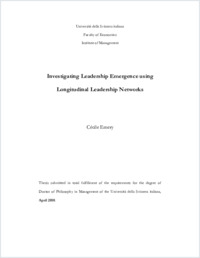Investigating leadership emergence using longitudinal leadership networks
- Emery, Cécile
- Larsen, Erik (Degree supervisor)
-
19.04.2010
120 p
Thèse de doctorat: Università della Svizzera italiana, 2010 (jury note: summa cum laude)
English
A growing body of research has examined emergent leadership within groups. Emergent leadership is defined as a process during which some individuals, over time and through social interaction, are recognized and accepted as leaders by the group. Interestingly, although there is much theorizing about how leadership emerges and about the individual characteristics facilitating the emergence of leaders, there is still very little about knowledge about this particular dynamic social process, and this is especially true if we expand our view of leadership beyond the leader-follower dyad. To refine our understanding of leadership emergence, I built my investigations on previous research on Distributed Leadership which recommends the use of social network analysis to study how leadership may be shared among several individuals. By envisioning leadership as a network of perceptions, where nodes and ties represent actors and leadership nominations respectively, a complex and multi-level representation of leadership is gathered. While social network analysis has been successfully applied to study distributed leadership using a cross-sectional approach, leadership emergence occurs over time and an analysis of this phenomenon would benefit from the use of a longitudinal perspective. I therefore collected leadership networks over several periods of time and used SIENA, a novel multilevel statistical procedure for longitudinal analysis of social networks, to examine, through three manuscripts, (i) How emergent leaders are the result of group processes?, (ii) Do emergent leaders perceive themselves as leaders? and (iii) Are emergent leaders emotionally intelligence?
- Language
-
- English
- Classification
- Economics
- License
-
License undefined
- Identifiers
-
- RERO DOC 19029
- URN urn:nbn:ch:rero-006-109081
- ARK ark:/12658/srd1318382
- Persistent URL
- https://n2t.net/ark:/12658/srd1318382
Statistics
Document views: 315
File downloads:
- Texte intégral: 241
